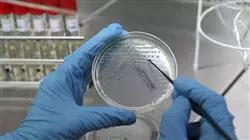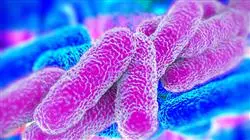University certificate
The world's largest faculty of medicine”
Introduction to the Program
Working from wherever you want and with a schedule that is fully adapted to your availability on the latest news about the Intestinal Microbiota and its clinical importance is now possible thanks to this comprehensive Postgraduate diploma"

The microorganisms that constitute the ecosystems of the human gut are key to the immune system. The Intestinal Microbiota acts as a very powerful defensive barrier, and in the antibody production for the identification and neutralization of pathogens that affect people's health. For this reason, achieving homeostasis through the care and production of these bacteria is fundamental for health, as it helps prevent a wide range of diseases, including dysbiosis, which alters the intestinal structure causing weakness and increasing the risk of suffering chronic pathologies such as diabetes, obesity or even different types of cancer.
Based on the importance of caring for these macroorganisms, TECH and its team of experts in Biology and Medicine, have developed a comprehensive program through which clinical specialists will be able to catch up on the latest developments in this field. This is the Postgraduate diploma in Intestinal Microbiota, a 100% online program that will allow students to delve into the latest scientific advances related to the microbiome and metagenomics. In addition, they will work with the most innovative information related to homeostasis and dysbiosis, as well as the best treatments for each of them.
For this purpose, students will have 450 hours of diverse content: the syllabus, designed by a teaching team specialized in the field, clinical cases extracted from their consultations, research articles, complementary readings, self-knowledge exercises, news, dynamic summaries of each unit and much more. All compacted in a convenient and flexible 100% online format, and whose Virtual Campus can be accessed from any device with internet connection. In this way, students will not depend on schedules or on-site classes to update their knowledge, being able to combine the course with their clinical agenda.
You will be able to get up to date on the factors that influence the balance and imbalance of the microbiota, 100% online”
This Postgraduate diploma in Intestinal Microbiota contains the most complete and up-to-date scientific program on the market. The most important features include:
- Case studies presented by experts in the Digestive System
- The graphic, schematic, and practical contents with which they are created, provide scientific and practical information on the disciplines that are essential for professional practice
- Practical exercises where the self-assessment process can be carried out to improve learning
- Its special emphasis on innovative methodologies
- Theoretical lessons, questions to the expert, debate forums on controversial topics, and individual reflection assignments
- Content that is accessible from any fixed or portable device with an Internet connection
Esophageal, gastric, and gallbladder microbiota, to name a few This Postgraduate diploma will cover all of them, as well as the clinical and diagnostic innovations to take care of them based on the most effective techniques”
The program’s teaching staff includes professionals from the sector who contribute their work experience to this educational program, as well as renowned specialists from leading societies and prestigious universities.
The multimedia content, developed with the latest educational technology, will provide the professional with situated and contextual learning, i.e., a simulated environment that will provide immersive education programmed to learn in real situations.
This program is designed around Problem-Based Learning, whereby professionals must try to solve the different professional practice situations that arise during the academic year. For this purpose, the student will be assisted by an innovative interactive video system created by renowned and experienced experts.
You will have unlimited access to the Virtual Campus, being able to use it from any device with internet connection"

You will work with the most up-to-date information related to intestinal homeostasis and the most innovative guidelines to achieve it"
Why study at TECH?
TECH is the world’s largest online university. With an impressive catalog of more than 14,000 university programs available in 11 languages, it is positioned as a leader in employability, with a 99% job placement rate. In addition, it relies on an enormous faculty of more than 6,000 professors of the highest international renown.

Study at the world's largest online university and guarantee your professional success. The future starts at TECH”
The world’s best online university according to FORBES
The prestigious Forbes magazine, specialized in business and finance, has highlighted TECH as “the world's best online university” This is what they have recently stated in an article in their digital edition in which they echo the success story of this institution, “thanks to the academic offer it provides, the selection of its teaching staff, and an innovative learning method aimed at educating the professionals of the future”
A revolutionary study method, a cutting-edge faculty and a practical focus: the key to TECH's success.
The most complete study plans on the university scene
TECH offers the most complete study plans on the university scene, with syllabuses that cover fundamental concepts and, at the same time, the main scientific advances in their specific scientific areas. In addition, these programs are continuously being updated to guarantee students the academic vanguard and the most in-demand professional skills. In this way, the university's qualifications provide its graduates with a significant advantage to propel their careers to success.
TECH offers the most comprehensive and intensive study plans on the current university scene.
A world-class teaching staff
TECH's teaching staff is made up of more than 6,000 professors with the highest international recognition. Professors, researchers and top executives of multinational companies, including Isaiah Covington, performance coach of the Boston Celtics; Magda Romanska, principal investigator at Harvard MetaLAB; Ignacio Wistumba, chairman of the department of translational molecular pathology at MD Anderson Cancer Center; and D.W. Pine, creative director of TIME magazine, among others.
Internationally renowned experts, specialized in different branches of Health, Technology, Communication and Business, form part of the TECH faculty.
A unique learning method
TECH is the first university to use Relearning in all its programs. It is the best online learning methodology, accredited with international teaching quality certifications, provided by prestigious educational agencies. In addition, this disruptive educational model is complemented with the “Case Method”, thereby setting up a unique online teaching strategy. Innovative teaching resources are also implemented, including detailed videos, infographics and interactive summaries.
TECH combines Relearning and the Case Method in all its university programs to guarantee excellent theoretical and practical learning, studying whenever and wherever you want.
The world's largest online university
TECH is the world’s largest online university. We are the largest educational institution, with the best and widest online educational catalog, one hundred percent online and covering the vast majority of areas of knowledge. We offer a large selection of our own degrees and accredited online undergraduate and postgraduate degrees. In total, more than 14,000 university degrees, in eleven different languages, make us the largest educational largest in the world.
TECH has the world's most extensive catalog of academic and official programs, available in more than 11 languages.
Google Premier Partner
The American technology giant has awarded TECH the Google Google Premier Partner badge. This award, which is only available to 3% of the world's companies, highlights the efficient, flexible and tailored experience that this university provides to students. The recognition as a Google Premier Partner not only accredits the maximum rigor, performance and investment in TECH's digital infrastructures, but also places this university as one of the world's leading technology companies.
Google has positioned TECH in the top 3% of the world's most important technology companies by awarding it its Google Premier Partner badge.
The official online university of the NBA
TECH is the official online university of the NBA. Thanks to our agreement with the biggest league in basketball, we offer our students exclusive university programs, as well as a wide variety of educational resources focused on the business of the league and other areas of the sports industry. Each program is made up of a uniquely designed syllabus and features exceptional guest hosts: professionals with a distinguished sports background who will offer their expertise on the most relevant topics.
TECH has been selected by the NBA, the world's top basketball league, as its official online university.
The top-rated university by its students
Students have positioned TECH as the world's top-rated university on the main review websites, with a highest rating of 4.9 out of 5, obtained from more than 1,000 reviews. These results consolidate TECH as the benchmark university institution at an international level, reflecting the excellence and positive impact of its educational model.” reflecting the excellence and positive impact of its educational model.”
TECH is the world’s top-rated university by its students.
Leaders in employability
TECH has managed to become the leading university in employability. 99% of its students obtain jobs in the academic field they have studied, within one year of completing any of the university's programs. A similar number achieve immediate career enhancement. All this thanks to a study methodology that bases its effectiveness on the acquisition of practical skills, which are absolutely necessary for professional development.
99% of TECH graduates find a job within a year of completing their studies.
Postgraduate Certificate in Intestinal Microbiota
The intestinal microbiota and the multiple researches, studies and tests carried out around this bacterial ecosystem have allowed the development and evolution of several fields of medicine, standing out as a sector of great relevance nowadays. Due to this situation, professionals specialized in microbiota have, nowadays, a great labor reception. Understanding the need for academic updating that accompanies the growth, development and expansion of this important occupational field, at TECH Global University we have designed our program of Postgraduate Certificate in Intestinal Microbiota. In this postgraduate Postgraduate Certificate, special emphasis will be placed on the knowledge and identification of the various factors and disorders that contribute to the appearance of intestinal dysbiosis cases. Likewise, it will delve into the modernization of the following concepts: the identification of the main characteristics of the protective, immunomodulatory, muconutritive and fungal microbiota; and the knowledge of the different strategies used in the nutritional modulation of intestinal dysbiosis.
Study an online Postgraduate Certificate in Intestinal Microbiota
The balance of the intestinal ecosystem of a patient requires the involvement and care of a long list of elements, being necessary for its proper monitoring the presence of specialized professionals with a high level of preparation. In our program of Postgraduate Certificate you will approach the set of knowledge, skills and criteria necessary for an adequate development in the area of intestinal microbiota care. Likewise, in this postgraduate program you will deepen in the updating of the following topics: the modern understanding of the composition of the intestinal microbiota throughout the different stages of life, contemplating the particularities of its stable and unstable phases; and the knowledge of the latest research developed around the relationship of intestinal dysbiosis with the appearance of chronic inflammatory bowel diseases.







